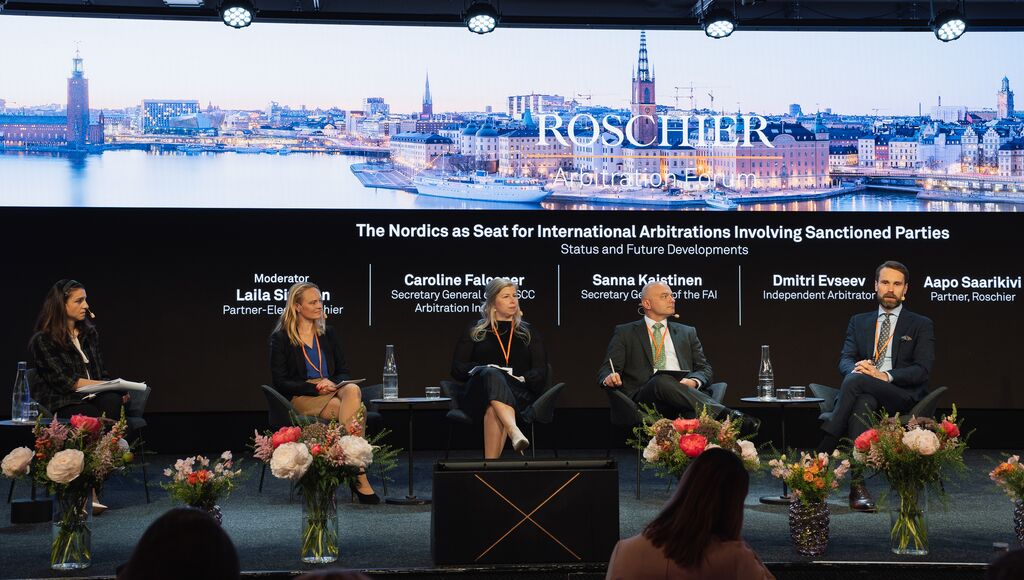
Insights | June 7, 2023
Roschier Arbitration Forum 2023: Navigating the new geopolitical landscape in arbitration
Since its launch in 2009, Roschier has been the proud host of the Roschier Arbitration Forum, which is held annually. This year's well-attended event took place in Stockholm in late May 2023. The panels were composed of leading arbitration practitioners, scholars, and experienced in-house counsel, who gave their expert views on developments in the international arbitration environment in the wake of Russia's invasion of Ukraine.
The guest speakers at the event were Steffen Hindelang (Uppsala University), Paschalis Paschalidis (Arendt), Lars-Göran Larsson (ISP), Caroline Falconer (SCC), Sanna Kaistinen (FAI), Dmitri Evseev (Arbitra International), Said Mahmoudi (Stockholm University), Samantha J. Rowe (Debevoise), Aino Kyytsönen (Huhtamäki) and David Ribbing (AFRY). The guest speakers were joined by Johan Sidklev, Emma Johansson, Aapo Saarikivi and Shirin Saif, all practitioners at Roschier. The panels were moderated by Roschier’s Bruno Gustafsson, Laila Sivonen and Paula Airas.
Key takeaways
Investment screening – Protecting a sovereign’s strategic interests vs. investors’ rights under international law
With respect to the topic of investment screening, the panel discussed in particular the EU Investment Screening Regulation (Regulation (EU) 2019/452), which has been in force since 2020. The Swedish Inspectorate of Strategic Products (ISP) is currently working on implementing this legislation in Sweden. The panel mentioned the marked increase in filings due to the lack of monetary thresholds, the broad scope of the regulation, and the fact that the anticipated number of applications under this regime is expected to be around 1,500 per year.
The panel also made some interesting comments about the remedies available to companies that are denied the opportunity to make investments within the scope of the investment screening mechanism. Court claims and BIT claims were suggested as a way forward, although it was acknowledged that there were some issues concerning the standing of an investor to bring a claim. One example raised was the question of whether there is an “investment” which would enable an investor to bring a claim if the investor has never been allowed to invest because it was red flagged in the investment screening process.
In terms of current and future focus areas, the panel predicted that the number of jurisdictions adopting investment screening will continue to increase, especially in developing countries. Another hot topic is the screening of outbound investments. Also, with respect to the ISP, the focus area is the implementation of the 2019 legislation as efficiently as possible, which will involve the ISP coordinating with many other agencies.
The Nordics as seat for international arbitrations involving sanctioned parties – Status and future developments
The second panel agreed that sanctions are very complex in general, especially when new sanctions packages are implemented and revised on a regular basis. Naturally, this leads to difficulties in interpreting and applying the sanctions. This is a problem not only with respect to exits from Russia, but also in the context of arbitrations. Therefore, it is crucial to maintain a good relationship with your bank.
Another matter discussed by the panel was the difficulty in obtaining Swedish counsel because of a general unwillingness or inability to act as counsel for sanctioned parties. This has been a hot topic in the past year, and it has frequently been used as an argument as to why parties need to postpone or stay arbitral proceedings. However, these arguments might be weaker than has been perceived by the market since there is no absolute requirement in Swedish cases for counsel acting for one or both parties to be Swedish. Furthermore, many European law firms are willing and able to represent sanctioned parties although very few are open about it.
Finally, with respect to Sweden as a seat for arbitrations involving Russian parties, the second panel discussed the fact that Sweden has probably not been perceived by Russian parties as being fully neutral for quite some time now, regardless of the current geopolitical development in Europe. According to the panel, this has presumably more to do with some unfavorable outcomes in earlier cases than anything else. However, as there are many long-term contracts containing SCC clauses still in force, it will take some time before the impact can be measured properly.
Investment arbitration in the wake of Russia’s invasion of Ukraine: Causes of action, prospects of success for investors, and status of pending cases
The panelists discussed their reactions to the invasion and the initial actions taken after the invasion as well as the considerations behind these actions. Employee safety, sanctions, countersanctions, and the consequences for those dependent on products provided by Western companies were some of the issues raised in these respects.
As for claims that may be brought against Russia, several questions will become relevant, such as whether the invasion in and of itself constitutes a breach of treaty standards, and whether the countersanctions themselves may constitute a breach of treaty protection. Many investors will likely argue that a breach of the fair and equitable treatment standard, and in some cases indirect expropriation, has occurred. Several interesting comments were made about how tribunals previously have dealt with similar issues and the problems posed under international law.
Regardless of the legal perspective, the prospects of obtaining payment for successful claims against Russia remain uncertain.
We look forward to welcoming you to next year’s Roschier Arbitration Forum!
Article written by Associate Joakim Raivio.